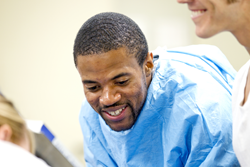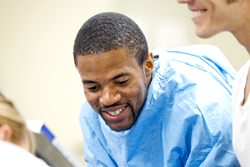'This school opened my eyes' to rural medicine


May 2014
By Brett Thomas
This column was printed in the May 17 edition of the Tallahassee Democrat
You read a lot these days about student debt. In these past four years at the Florida State University College of Medicine, I’ve learned that there are at least two kinds: monetary debts, and debts of gratitude.
One concern about financial debt is that it might discourage medical students from pursuing primary care, where the annual compensation is less than some other medical specialties. In fact, a few physicians urged me to reconsider my choice of family medicine for that reason.
However, just as many encouraged me to follow my passion, no matter what. I remember making that commitment at a Christian Medical Association meeting during my second year of medical school. A family physician serving in an urban community in Birmingham, Ala., gave a presentation on the importance of being intentional with your training and the impact it can make among those who are medically underserved. Finishing in the top 10 percent of his class, he could have chosen more competitive medical specialties that currently generate more income — but that’s not where the greatest need was. I felt he was speaking directly to me.
That brings me to the debts of gratitude.
I’m indebted to my wife, family, mentors and friends, who encouraged me to follow where I thought God was leading me and pursue family medicine.
I’m indebted to the National Health Service Corps, which ultimately rendered moot the whole debate over whether I could “afford” family medicine. Along with my classmate Alyson Lewis, I received a Student to Service Loan Repayment award. The NHSC will pay $120,000 toward my student loans — in exchange for three years of service in an area of great medical need, after I complete my residency training.
Finally, I'm indebted to the College of Medicine. It taught me that just as important as passion is competence, and my clinical training here has been superb. FSU also exposed me to the need for primary medical care in communities across Florida, including here in the Tallahassee area. This school opened my eyes to the joys of being a physician in a rural and underserved area. During my Summer Clinical Practicum in Blountstown, several patients asked me not to forget them — and to consider serving as their primary care doc one day.
That commitment to serve is the main reason I chose this school. Its mission is to respond to community needs, especially through service to elder, rural, minority and underserved populations. And it’s fulfilling that mission, according to the Association of American Medical Colleges’ annual Missions Management Tool.
Twice in the past five years, according to the latest data, the FSU College of Medicine was the top medical school in the country for providing instruction in community health, where most patients receive their health care. During those three other years, we ranked in the 99th percentile.
The AAMC comparison also reveals that the College of Medicine is among the top programs for:
- Graduating a workforce that will address the nation’s priority health needs.
- Preparing physicians to fulfill community needs.
- Graduating black or African-American physicians.
- Providing instruction and field experiences in community health.
- Providing instruction in culturally appropriate care.
- And producing primary care physicians.
Best of all, College of Medicine alumni are serving Big Bend communities. In addition to the 18 new primary care physicians who see patients in Tallahassee, our alumni are caring for patients in Crestview, Bonifay, Apalachicola, Pace, Perry, Quincy and other towns that have historically struggled to recruit new doctors.
About three years from now, my wife and I hope to join them.
Brett Thomas, who grew up in Wakulla and Leon counties, is president of the FSU College of Medicine’s Class of 2014. He and his classmates will graduate today.

